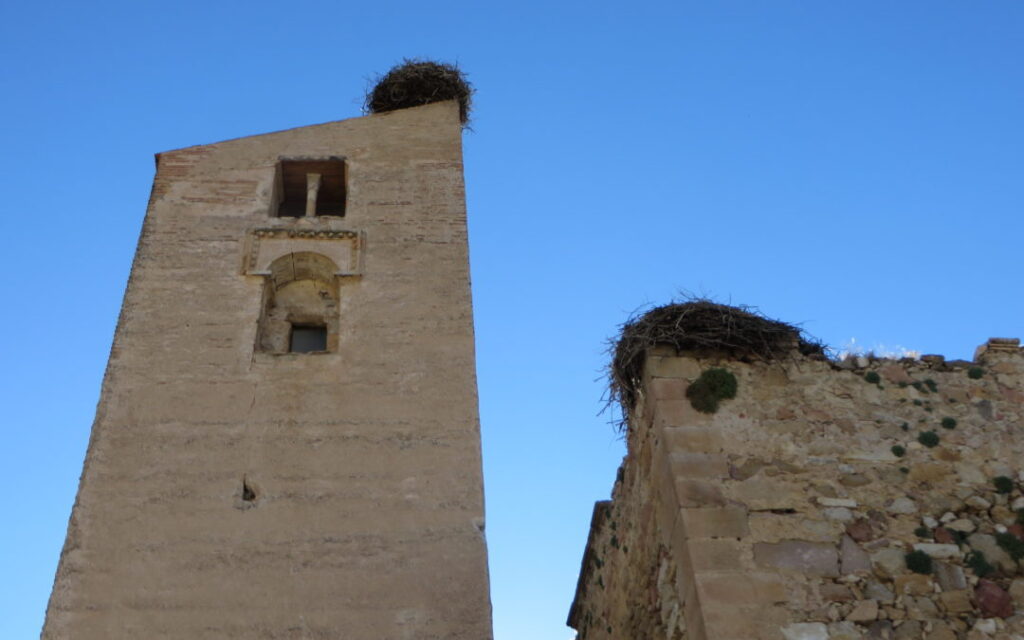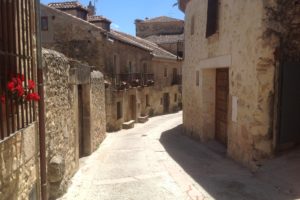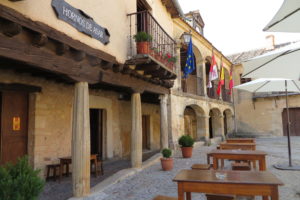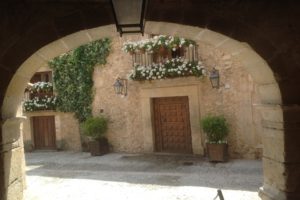“Mis patas rojas, mi pico largo y hago mi casa en el campanario” (My legs are red, my beak long and I make my nest in the bell tower). This traditional Spanish riddle refers to a creature that stands as a symbol for purity, creativity, prosperity, good luck and fidelity. However, because the white stork is best known for delivering babies, this iconic bird is also a symbol of renewal and rebirth. What better symbol for Spain’s own rebirth in international business than the stork, and what better place to hold conversations in English with Spanish business people than the medieval town of Pedraza where storks nest on top of every bell tower.

Spain suffers from an unemployment rate of over 24%, with 50% unemployment among Spanish youth. Since few people in Spain speak English, and English is the universal language of business, the country has fallen behind in the global business arena.
Vaughan Systems, Spain’s largest English language instructional company, has striven for over 30 years to help the Spanish learn English as a second language. To further this endeavor, the company’s VaughanTown program brings together Spanish business people and Anglo volunteers from around the world to hold conversations in English for six days in the Spanish countryside. VaughanTown is an opportunity for Spanish people to become more fluent in the English language, to experience a rainbow of English dialects to facilitate their growth as international business partners, and to help bring Spain into the mainstream of the global economy.
For us Anglo volunteers, VaughanTown is an opportunity to learn about Spain — its culture, its cuisine, its history — and to make lifelong friends with Spaniards and Anglos from across the globe. Vaughan Systems makes it as easy as possible for Anglos to participate, as they take care of all expenses during the program. The Anglos pay only for their flights and any costs incurred outside of the program.
There is no need for the Anglos to know Spanish. Since this is an English immersion program for the Spaniards, Spanish is banned for the six days. In fact, if you’re caught speaking Spanish, you could be removed from the program. No worries, though. The Spaniards’ level of English is quite high. During the week, they expand their vocabulary further and develop confidence in conversing with Anglos. If a Spaniard does not understand something, it’s a fun challenge to find another way of expressing yourself in English.
As I had done two years ago in Valdelavilla, once again I traveled to Spain to participate in VaughanTown, this time in Pedraza, a medieval town in the province of Segovia, about an hour and a half northwest of Madrid. In 1951, Pedraza was named a National Historical Heritage site and has become a popular weekend tourist and wedding destination.
Our group stayed at Hotel de la Villa, one of several hotels in the town. The building had been a private residence that was converted into a hotel, so each charming room was unique. From my second floor room, I could see the San Juan Bautista church bell tower through the dormer window and a stork’s nest on top of it. My second morning in Pedraza, I was excited to see a stork in the nest.
Pedraza, with approximately 500 residents, is engulfed by a protective wall, with only one gate through which to enter and exit the town. Its black poplar doors hang ready to seal the arched stone gateway in case of attack. On either side of the gate and wrapped over the top of it, a 13th century prison stands sentry.

Within the medieval ramparts, stone buildings line narrow cobblestone streets. Carved wooden doors and wrought iron grates adorn every building, and window boxes overflow with flowers. Churches remind the faithful not to stray too far. And yes, their bell towers play host to storks’ nests. At the far end of the town, a 13th century castle overlooks the beautiful rolling countryside with a view of an ancient Roman aqueduct below in the valley. In 1926, renowned Spanish painter Ignacio Zuloaga bought the castle, which now houses some of his masterpieces.
One morning, we had a group outing to tour both the prison and castle. The tours were conducted in Spanish. Each Spaniard in our program was assigned to two Anglos to interpret the tour into English for them, a challenging exercise for the Spaniards.

It really didn’t matter where we went, as long as we were having conversations in English. During our one-to-one sessions with the Spaniards, we were free to wander the streets and talk, journey to the far end of town together to see the castle, enjoy the lovely panoramic view of the surrounding landscape and visit Plaza Major (the town’s central square) for coffee at a café/bar.
Meals in our hotel were obligatory but thoroughly enjoyable times for conversation, with two Spaniards and two Anglos at each table. To enhance conversation, local wine was served at both lunch and dinner. According to many of the Spaniards in our program, the delicious food in the hotel’s restaurant was traditional Spanish cuisine, usually served in the winter months.
Our working days began at the 9:00 am breakfast and ended after dinner around 10:00 pm. But because friendships formed quickly, conversation and partying continued well after dinner each night.
Every evening before dinner, we had entertainment in the form of skits, songs and dance. Who were the performers? The program participants, of course! Both Anglos and Spaniards were chosen to rehearse something in the afternoon. That evening, they would perform for the group. It posed a nerve-wracking trial for some and fun for all.
One evening, we were treated to Queimada, a traditional Galician punch made with the distilled spirit Orujo, sugar, coffee beans, lemon peel and cinnamon. It’s traditionally prepared in a hollow pumpkin, but our version was made in a clay pot. The liquid was set afire while incantations and spells were chanted. Visions of witches danced in our heads as the preparer stirred the concoction with a ladle, lifted it high and poured the fiery blue liquid back into the pot. Though some of the alcohol was burned off in the preparation, much of it still remained when the cocktail was ready to consume. It was pretty potent stuff.
On our last full day, the Spaniards had to do a five minute presentation in front of the group. One of the presentations summed up the week perfectly. It was about killing one’s fears: the fear of public speaking; the fear of acting and the fear of speaking English with Anglos.
Just as storks in the bell towers of Pedraza were symbols of renewal, speaking English in VaughanTown was a sort of renewal for the Spaniards. In the course of the week, they conquered their fears of speaking English, built their language skills and confidence, and reinvented themselves in their own kind of rebirth, one that would position them as global leaders in a new economy. In a sense, we were all reborn in this place called Pedraza and this program called VaughanTown, for both Spaniards and Anglos were inspired to move forward with renewed enthusiasm into a prosperous future.


